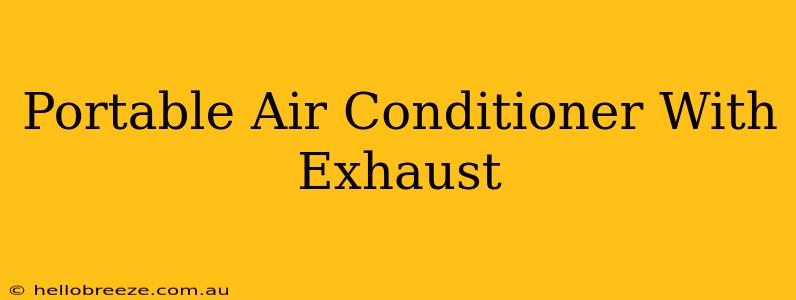Summer heat can be unbearable, especially without a reliable cooling system. A portable air conditioner with an exhaust hose offers a convenient solution for those who rent, live in apartments, or simply prefer the flexibility of a movable unit. But with so many options on the market, choosing the right one can feel overwhelming. This guide will help you navigate the world of portable air conditioners with exhaust hoses, ensuring you find the perfect fit for your needs.
Understanding Portable Air Conditioners and Exhaust Systems
Portable air conditioners differ from window units in their mobility. They are self-contained units that cool a room by drawing in warm air, cooling it, and then expelling the hot air outside through an exhaust hose. This exhaust hose is crucial – it's how the unit gets rid of the heat it absorbs. Without a proper exhaust, the unit won't function effectively and could even damage the appliance.
Key Features to Look For:
- BTU (British Thermal Units): This rating indicates the cooling capacity of the air conditioner. Higher BTUs mean more powerful cooling, but also often mean higher energy consumption. Choose a BTU rating appropriate for the size of the room you plan to cool. A general rule of thumb is 1 BTU per square foot, but consider factors like insulation, sunlight exposure, and ceiling height.
- Exhaust Hose Length and Design: The length of the exhaust hose is critical. A longer hose allows for more placement flexibility, but longer hoses can sometimes reduce cooling efficiency. Look for a hose with a good seal to prevent warm air from leaking back inside. Some models feature adaptable hose lengths or even dual exhaust options.
- Noise Level: Portable AC units can be noisy. Check the decibel rating (dB) before purchasing. Lower dB ratings indicate quieter operation. Consider the location of the unit and whether noise will be a significant concern.
- Energy Efficiency (EER or SEER): The Energy Efficiency Ratio (EER) or Seasonal Energy Efficiency Ratio (SEER) indicates how efficiently the unit uses energy to cool. Higher EER/SEER ratings mean lower energy bills.
- Dehumidification Feature: Many portable air conditioners offer dehumidification, which is helpful in humid climates. This function removes excess moisture from the air, improving comfort levels.
- Filters and Maintenance: Easy-to-clean and replace filters are essential for maintaining the unit's efficiency and longevity. Regular filter cleaning will help prevent dust and allergens from circulating in your space.
Choosing the Right Portable Air Conditioner with Exhaust
Consider these factors when selecting your portable air conditioner with an exhaust:
- Room Size: Accurately measure the square footage of the room you want to cool.
- Budget: Portable AC units range in price from budget-friendly to premium. Set a realistic budget beforehand.
- Placement: Determine where you can comfortably place the unit and ensure there's enough space for the exhaust hose.
- Features: Decide which features are most important to you, such as dehumidification, energy efficiency, and noise level.
Installation and Maintenance Tips
Installing a portable air conditioner is generally straightforward. Simply position the unit, extend the exhaust hose, and plug it in. However, it is crucial to ensure the exhaust hose is properly sealed and directed outside to prevent backflow of hot air.
Regular maintenance is key to extending the life of your portable air conditioner. This includes:
- Cleaning the filters regularly.
- Checking and cleaning the condenser coils.
- Ensuring proper ventilation around the unit.
- Storing the unit properly during the off-season.
Portable Air Conditioner with Exhaust: FAQs
Q: Can I leave the portable air conditioner running all night?
A: Yes, most portable air conditioners are designed for continuous operation. However, always follow the manufacturer's instructions.
Q: How often should I clean the filters?
A: It's recommended to clean the filters every 2-4 weeks, depending on usage and environmental conditions.
Q: What if my exhaust hose is too short?
A: You may be able to purchase an extension hose from the manufacturer or a similar retailer. However, be aware that extending the hose may slightly reduce cooling efficiency.
By carefully considering these factors and tips, you can find the perfect portable air conditioner with an exhaust to beat the heat and enjoy cool, comfortable living, no matter the season. Remember to always consult the manufacturer's instructions for detailed information on installation, operation, and maintenance.

